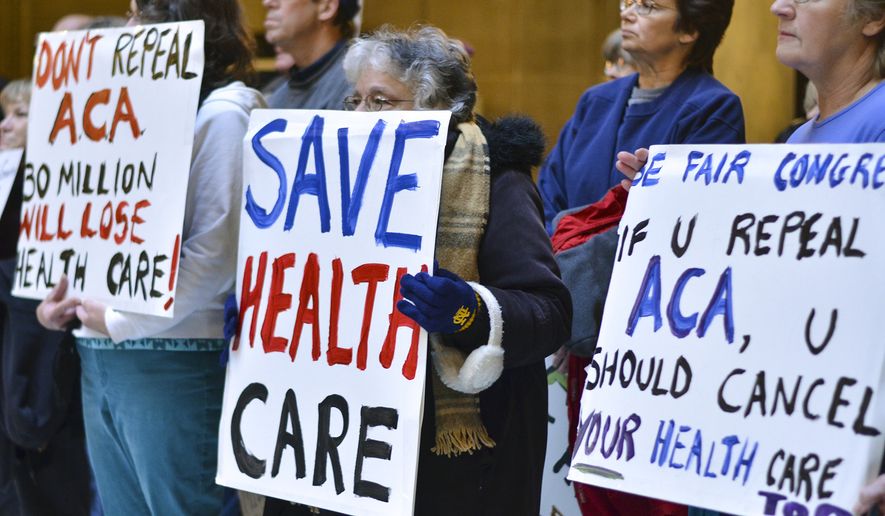An outright repeal of Obamacare would oust about 32 million people from their insurance and send premiums soaring over the next decade, the Congressional Budget Office said Tuesday, putting new pressure on the GOP to craft a replacement plan for the health law.
The CBO examined a two-year-old GOP repeal bill that used fast-track rules to gut Obamacare, and said that a repeal would cost 18 million Americans insurance in just the first year alone.
Republicans said the calculation was unfair, since they intend to not only repeal the Affordable Care Act but to replace it with a new plan. But Democrats said the numbers should make the GOP think twice.
“Tens of millions will lose their health insurance, and individuals will see their premiums double,” said Senate Minority Leader Charles E. Schumer, New York Democrat. “This is exactly why Republican members of Congress are getting an earful back home from constituents who want them to turn back from their dangerous plan to make America sick again.”
Republicans have made repealing Obamacare their top priority of the new Congress, hoping to work with a Trump administration to get a replacement ready.
Congress voted last week to impose a Jan. 27 deadline for the repeal legislation, using the complicated but powerful budget process, which allows them to avoid a Democratic filibuster.
The GOP tried a similar approach in 2015, passing a repeal that was vetoed by President Obama. That bill would have ended the “individual mandate” requiring Americans to hold insurance, and would have phased out Obamacare’s expansion of Medicaid and taxpayer-funded subsidies that help people buy private plans.
The CBO said that without the government subsidies, millions of customers will stop buying plans.
Senate Finance Committee Chairman Orrin G. Hatch, Utah Republican, said the CBO report only tells half the story.
“Republicans support repealing Obamacare and implementing step by step reforms so that Americans have access to affordable health care,” Mr. Hatch said. “The numbers in the report only represent a one-sided hypothetical scenario.”
Still, hospital groups and other stakeholders in the health sector are skittish about what could happen if the GOP fumbles the handoff.
During a Tuesday roundtable with reporters, Mr. Obama’s health secretary held up a copy of the report said it showed, “with analytics and numbers, what happens during that interim period” between repeal and a promised replacement.
“We are starting to see the movement from rhetoric to reality,” Health and Human Services Secretary Sylvia Mathews Burwell said.
Make no mistake, she said: Scrapping the law and then delaying its replacement “is repeal.”
Republican leaders insist they will coalesce around a replacement once Mr. Trump’s pick to succeed Mrs. Burwell, Rep. Tom Price, is confirmed, though individual lawmakers are rolling out their own plans in the meantime.
On Monday, Republican Sens. Bill Cassidy of Louisiana and Susan Collins of Maine will reissue a plan that would let states choose whether to stick with Obamacare and choose a GOP-preferred path.
“This is the basis for the legislation we are going to be introducing soon and would allow states to have more choices. If they like the Affordable Care Act, they can keep the Affordable Care Act. If they want to go an alternative route that is more patient centered, that would provide more choices and help to restrain costs, they could do that too and the federal government would bundle the funding that would otherwise be used for the ACA subsidies and expansion of Medicaid in their state and allow them to proceed along a more creative route,” Ms. Collins said.
Meanwhile, the House GOP’s election-year blueprint would dole out age-based tax credits and unleash market forces to make coverage more attractive, while setting up high-risk pools to take care of sick customers who’ve been priced out of the individual insurance market.
Mrs. Burwell, however, said Republicans must write their plans into legislation if they want to be taken seriously.
“An outline is not a plan,” she said. “A framework is not a plan.”
• Tom Howell Jr. can be reached at thowell@washingtontimes.com.




Please read our comment policy before commenting.